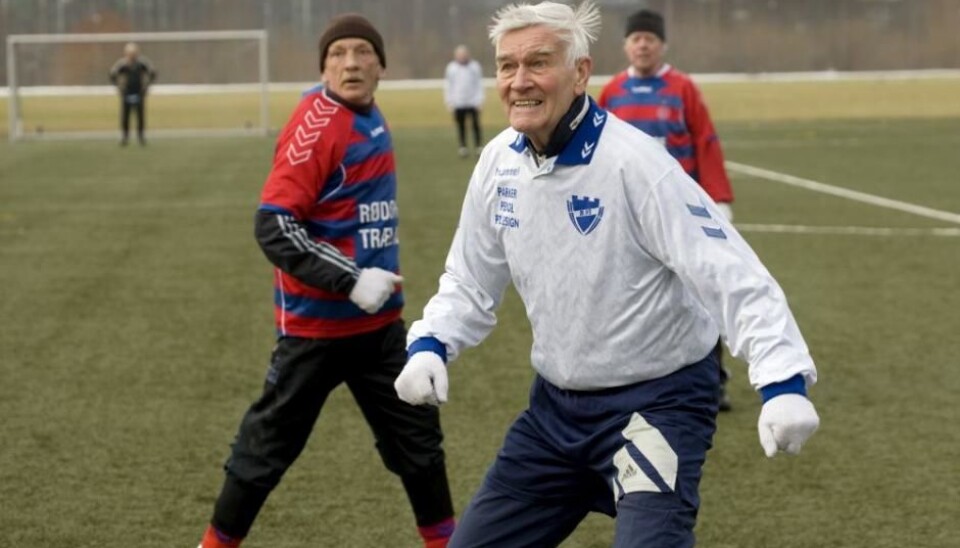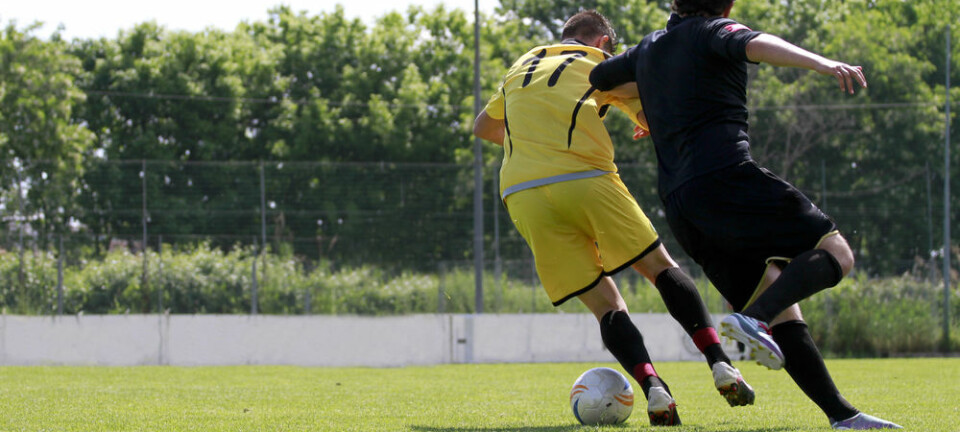
Playing football makes 70-year-olds’ bones young again
The sport could prevent osteoporosis later in life.
If you have played football twice a week for most of your life then there is a good chance that your bones will be strong by the time you reach your 70th birthday—just like Kaj Christensen, in the picture above.
In all aspects, Kaj’s bones are as strong as those of a 25-year-old who does not exercise.
These are the conclusions of a new study published in the Journal of Sport and Health Science.
A strong skeleton can potentially reduce the risk of developing osteoporosis or suffering broken bones later in life.
Impressive strength in old players’ bones
The results were an eye-opener, says professor Peter Krustrup, research group leader at the Department of Sports Science and Clinical Biomechanics at the University of Southern Denmark (SDU).
The research team looked at the mineral content in bones since a low mineral concentration is associated with osteoporosis.
“Seventy-year-olds who play football have similar whole-body bone scores as an untrained 25-year-old, and for some parameters they are actually superior to the youngsters. They have, for example, a 7.3 per cent higher bone mineral density in their legs,” says Krustrup.
“They have strong bones along with an impressive postural balance and muscle function, and this is interesting in connection with preventing osteoporosis and bone fractures as well as cardiovascular diseases,” he says.
The study was led by PhD student Marie Hagman from the University of Southern Denmark.
Many studies point to benefits of football
Hagman and Krustrup recruited 140 people in Denmark belonging to four groups:
- An “active group” of people between 65 and 80 years old who had played football most of their lives (a couple of times a week for 40 years or more)
- An “inactive group” of people, 65 to 80 years old, who had done almost no exercise in recent years and never at an ambitious level.
- An active group of young people who play football five times a week. These were elite football players, playing at second division level or higher.
- An inactive young group.
It can be difficult to make strong conclusions after a single study – particularly when it is based on tests and measurements of people’s bodies at a specific age and not over a long duration of time.
But Krustrup still calls the results both interesting and useful as it is based on a wealth of recent research into football training that has shown positive effects on bone mineral density for participants across the lifespan.
The study is the result of a year-long research collaboration between SDU and the University of Copenhagen. And the results show that older football players not only benefit from stronger bones, but also have better postural balance, rapid muscle force, heart function and aerobic fitness.
“In that way, long-term football training offers the full package in terms of preventing falls and fractures,” says Krustrup.
Life-long exercise regime keeps us in top form
The study delivers solid and important data, which show that life-long exercise keeps our bodies in top shape, says Professor Bente Langdahl from Aarhus University, Denmark, who studies bone fractures and brittleness.
“It underlines the fact that if you take one type of physical activity that involves running, hopping, and that kind of movement, then you can [stay on top],” she says.
It is “a really good starting point” as people with high bone mineral content will typically be less likely to have a fracture. But the actual risk of a break requires information on bone structure, which always weakens with age, says Langdahl. This requires a CT-scan or something similar.
So even though older football players in many ways have strong bones, this is no guarantee that they will avoid fractures.
Register studies will reveal more
One of the next steps in the research is to study the risk of fracture by digging down into Denmark’s national registers to see if there is a connection between playing football for a long period of time and hospital admissions related to bone fractures.
It could also be exciting to find out precisely how much football you need to play to reduce the risk of fractures.
But this might require information that does not exist. For example, how do you retrospectively evaluate the football activity of a large group of people throughout their entire lives?
Can football affect the ageing process?
Krustrup and his colleagues at SDU are now mapping the effects of five years of football training in older men suffering from prostate cancer.
They are also investigating whether the benefits of playing football can actually affect the ageing process. Perhaps, football postpones some of the worst aspects associated with ageing, including dementia.
A part of the answer may lie in the length of player’s telomeres and their ability to regenerate. Telomeres are the ends of chromosomes, which become shorter as we age.
“We believe that we’re expanding the knowledge of what lifelong football training can do to the ageing body,” says Hagman.
“But we have also sent samples to Germany, where telomeres are being studied to learn more about the ageing process in football players. I’m looking forward to seeing the results,” she says.
The new study only considers football, but other research from Krustrup’s group also shows positive fitness and health effects from other team sports, such as handball, floorball [a type of hockey], and basketball.
Scientists around the world are now mapping the health effects of numerous sports to learn more.
----------------
Read more in the Danish version of this story on Videnskab.dk
Translated by: Catherine Jex









